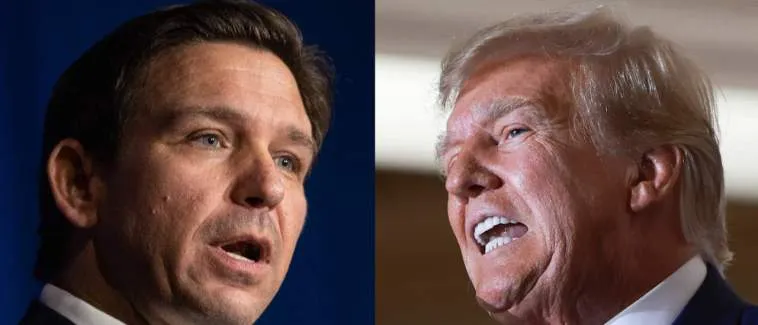(Daily Caller) Former President Donald Trump and Florida Gov. Ron DeSantis have been at each other’s throats over their respective COVID-19 responses, with the former president knocking DeSantis for his handling of the pandemic, and the governor hitting Trump for his relationship with Dr. Anthony Fauci and his stance on vaccines.
Trump ramped up his attacks on the governor following DeSantis’ presidential announcement in late May, claiming that former Democratic New York Gov. Andrew Cuomo handled COVID-19 better. DeSantis’ campaign has fired back, leaning into the governor’s COVID record and releasing an ad Monday with AI-generated images of Trump hugging Fauci, after the former president persistently hammered the governor over lockdowns.
Their respective records, however, reveal a complicated picture, with Trump and DeSantis each evolving in their response to COVID-19 as the pandemic continued.
‘Continues To Lie’
“Under Ron DeSanctimonious as Governor, Florida was the third WORST State in Deaths by Covid. So why do they say that DeSanctus did a good job? New York had fewer deaths! Also, he shut down the State, and even its beaches (unlike other Republican Governors),” Trump wrote May 30 on Truth Social.
In 2020, New York had the highest number of COVID-19 deaths, and though Florida was fourth, the Sunshine State had a significantly lower death rate than New York at 56.4 to 139.1, respectively, according to the CDC. In 2021, Florida’s death rate exceeded New York’s, though New York had more deaths total during the first two years of the pandemic.
DeSantis’ response to COVID-19, which was widely seen at the time as significantly less restrictive than other governors, helped elevate the Florida executive to the national stage. However, the Trump campaign has attempted to portray DeSantis as a proponent of severe restrictions, arguing that he imposed “radical” lockdowns.
“President Trump saved millions of lives, opposed mandates, and embraced the Federalist system to allow States to make the decisions best for their people. Ron DeSantis continues to lie about his record, as he personally oversaw mass vaccinations and imposed radical lockdowns,” the Trump campaign said in a press release shared with the DCNF upon request for comment.
While DeSantis would later become a fierce critic of lockdowns, school closures and mask mandates, particularly in the classroom, the governor did initiate COVID-19 restrictions early in the pandemic.
DeSantis began COVID-19 restrictions in early March, citing guidance from the Trump administration, where he closed down some non-essential businesses like bars and nightclubs, limited restaurant capacity while encouraging them to stay open and restricted beach access for larger groups. Guidance for counties with higher population densities like Palm Beach, Miami-Dade and Broward remained more strict.
The governor has recently argued that he fought the Trump administration’s recommended restrictions during the pandemic, and that “tens of thousands” of people “fled” Cuomo’s state to Florida, according to a June 1 campaign radio interview forwarded to the DCNF upon request for comment.
“Hell, his whole family moved to Florida under my governorship, are you kidding me?” DeSantis said.
The governor later broke from the Trump administration’s guidance during his push to reopen Florida, putting him in conflict with Fauci.
The governor also excoriated Trump in an interview with Daily Wire host Ben Shapiro, claiming Trump “elevated” Fauci. (RELATED: Trump’s Fauci Defense: DeSantis Praised Him Too)
“That was a difficult situation. We didn’t have all the facts,” said DeSantis. “But we all have to sit here today in 2023, look back on March of 2020 and say, ‘Faucism was wrong. Faucism was destructive.’”
Dr. Anthony Fauci
After the first COVID-19 case was discovered in Washington state on January 20, the Trump administration quickly formed the Coronavirus Task Force, with Fauci serving as a member. After several weeks of COVID-19 press briefings, Trump praised Fauci for becoming “a major television star for all the right reasons” and for being “just so professional, so good.”
However, the two began to clash about guidelines, and Trump promoted a tweet that said doctors and the CDC were “lying,” and another that criticized Fauci. Trump ramped up attacks on Fauci as the presidential election approached, often for his stance on masks, but said despite their disagreements, they got along “very well” and he liked him “personally.”
Additionally, Trump disagreed with Fauci about reopening businesses, tweeting that the country should “reopen” in May 2020.
Early on in the pandemic, DeSantis, too, frequently consulted the recommendations of Fauci and other members of the Trump administration’s task force, and thanked them for their support. On March 3, 2020, he shared a COVID-19 article written by Fauci and other doctors, which he said was a “useful” resource.
“You have a lot of people there who are working very, very hard, and they’re not getting a lot of sleep,” DeSantis said in March 2020. “They’re really focusing on a big country that we have. And from Dr. Birx to Dr. Fauci to the vice president who’s worked very hard, the surgeon general, they’re really doing a good job. It’s a tough, tough situation, but they’re working hard.”
Of course, DeSantis quickly became a critic of Fauci, breaking with him over reopening the state in late spring and early summer 2020, before beginning to regularly criticize him over his guidance in early 2021.
’15 Days To Slow The Spread’
Trump declared a national emergency on March 13, which freed up over $42 billion in resources for state and local governments. Days later, the administration announced the now-infamous “15 days to slow the spread” guidance encouraging people to stay at home, which was eventually extended through April 30.
On March 9, DeSantis signed an order declaring a public health emergency in Florida, and at the direction of the Trump administration the following week, he closed bars and nightclubs, restricted beach gatherings, and limited restaurant service to 50% capacity, but encouraged them to stay open.






